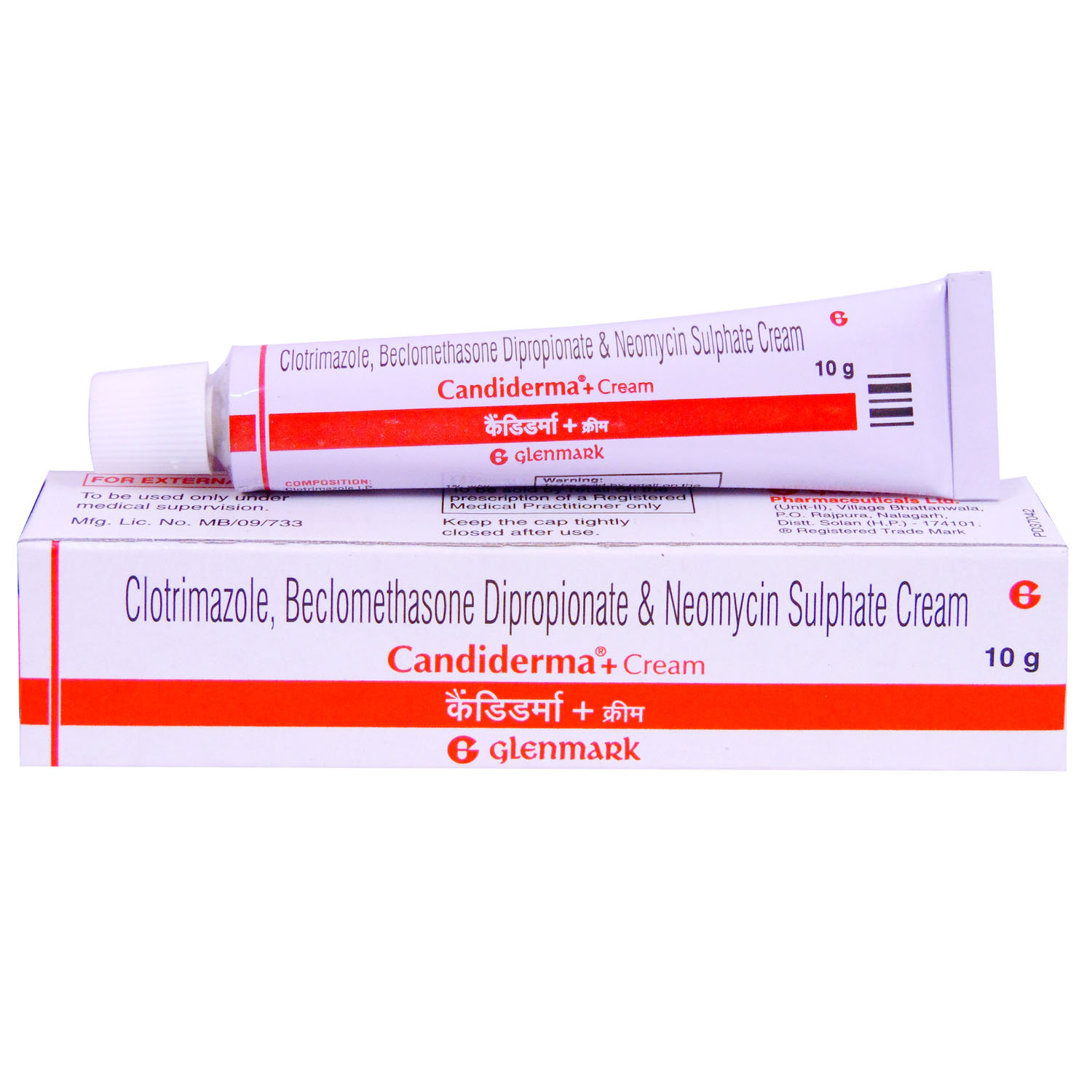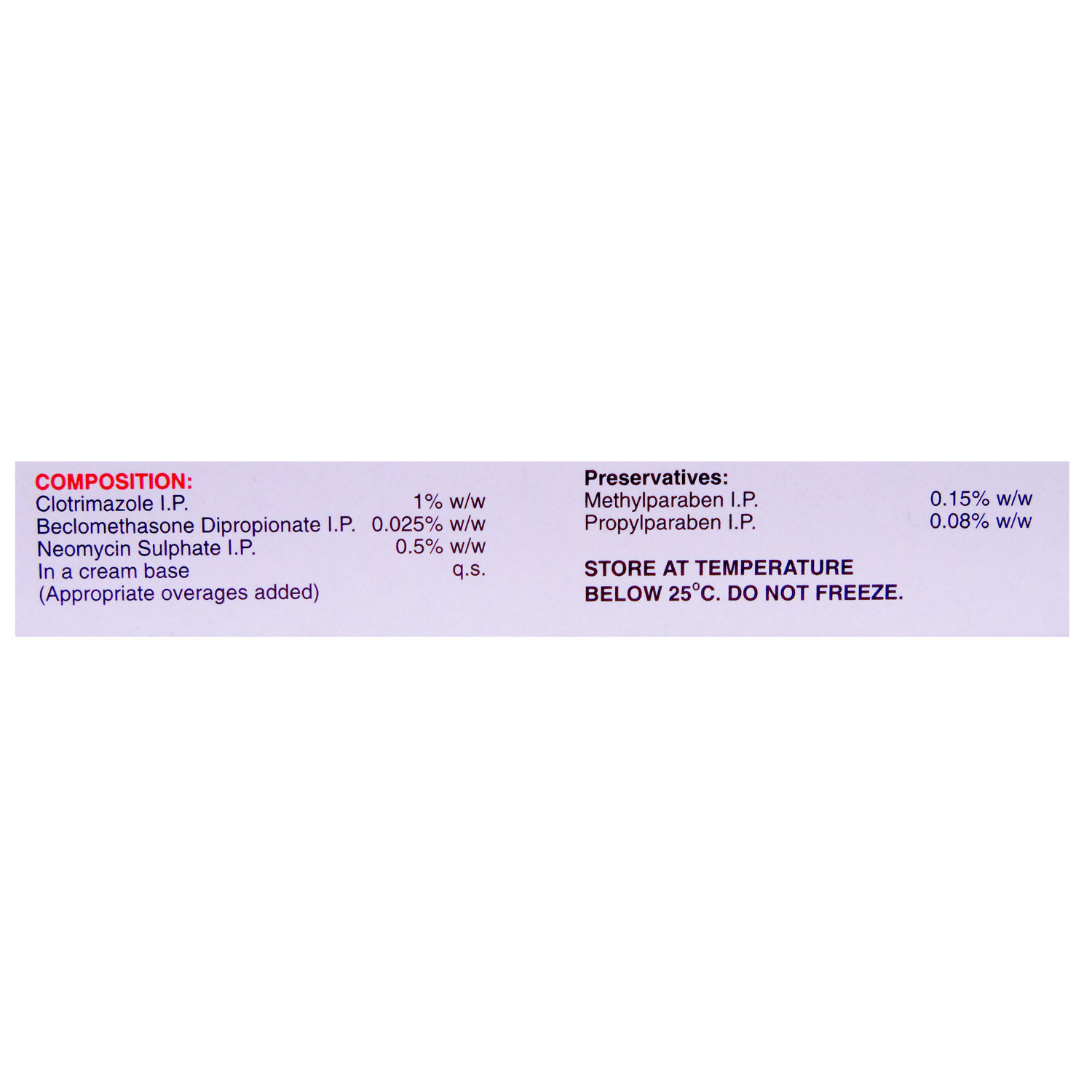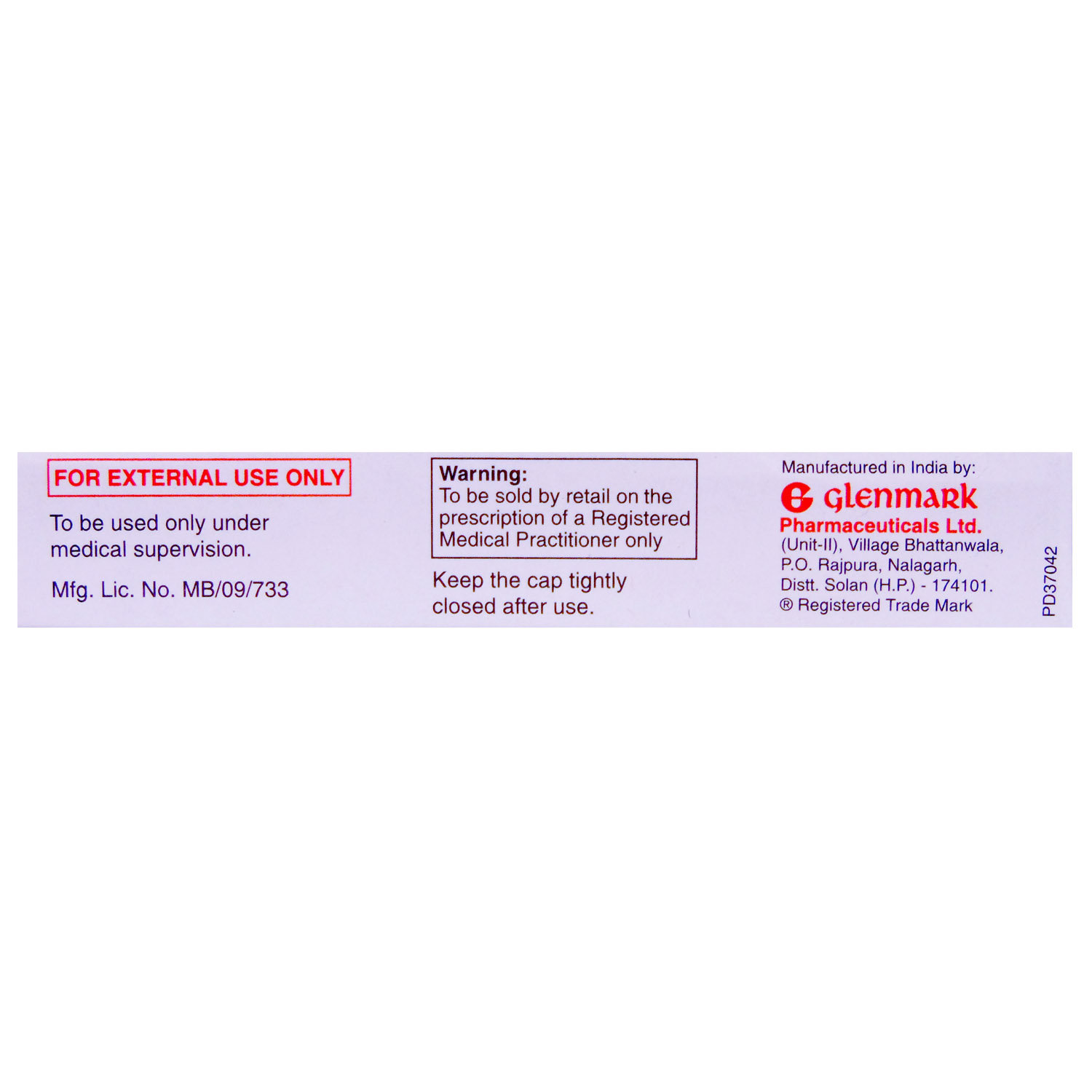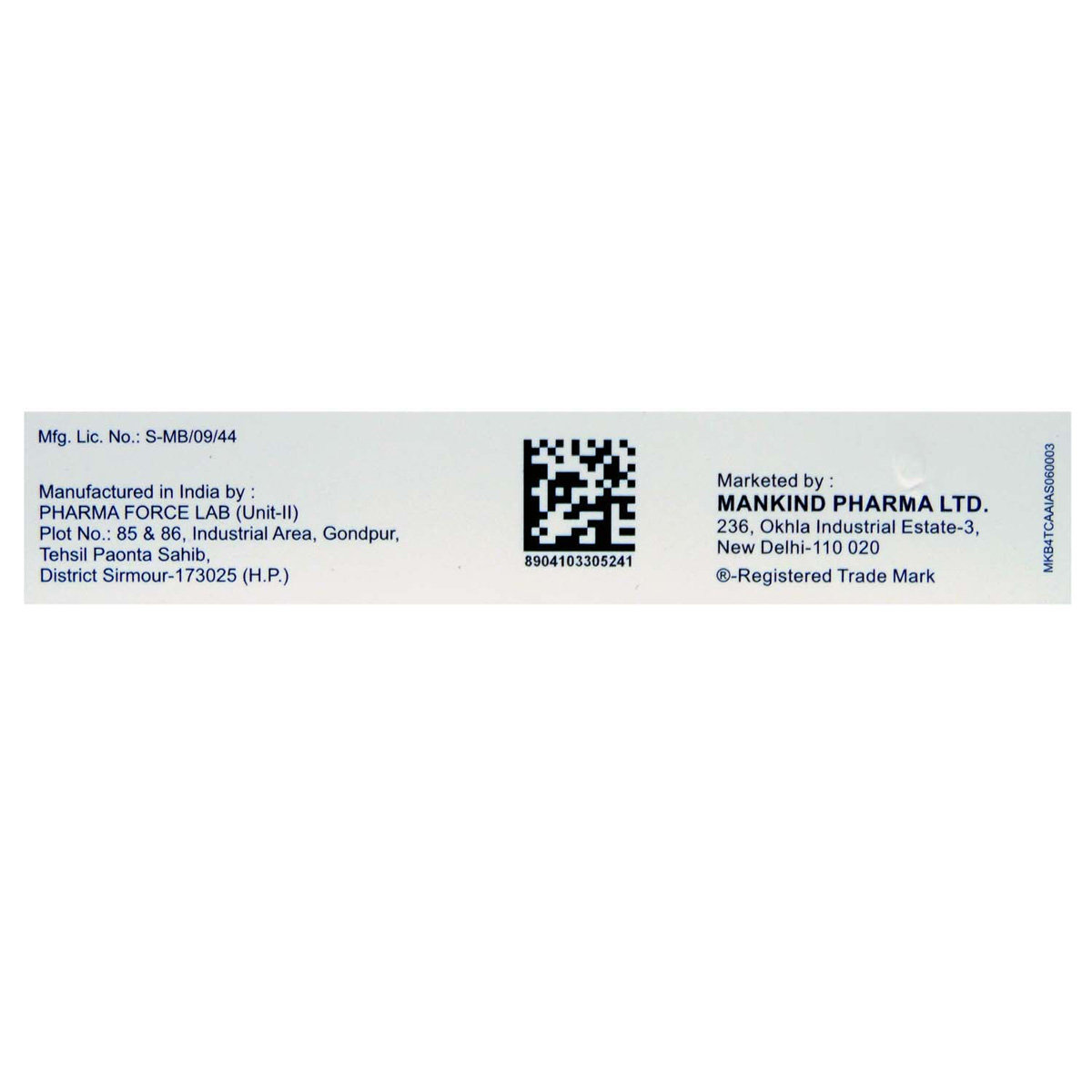Candiderma Plus Cream 10 gm



Selected Pack Size:10 gm
10 gm ₹119.7
(₹11.97 / 1 gm)
In Stock
20 gm ₹170.2
(₹8.51 / 1 gm)
In Stock
5 gm ₹108.9
(₹21.78 / 1 gm)
In Stock
MRP ₹133
(Inclusive of all Taxes)
₹19.9 Cashback (15%)
Candiderma Plus Cream is used to treat fungal and bacterial skin infections. It works by preventing fungal and bacterial growth. Common side effects include itching, redness, dryness, burning and stinging sensation at the site of application. It is an external preparation. Hence, avoid contact with eyes, ears, nose and mouth.
Know Your Delivery Time
Provide Delivery Location

Secure Payment

India's Most Trusted Pharmacy

Genuine Products
Manufacturer/Marketer :
Consume Type :
Return Policy :
Expires on or after :
About Candiderma Plus Cream
Candiderma Plus Cream is used to treat fungal and bacterial skin infections. It treats skin inflammation due to allergies or irritants, eczema (inflamed, itchy, cracked and rough skin patches), psoriasis (skin cells multiply rapidly to form bumpy/uneven red patches covered with white scales), insect bites and stings.
Candiderma Plus Cream contains Clotrimazole, Neomycin and Beclomethasone dipropionate. Clotrimazole damages the fungal cell membrane. Neomycin prevents the synthesis of essential proteins required by bacteria for vital functions. Beclomethasone dipropionate blocks prostaglandin's production, which makes the affected area red, swollen and itchy.
Common side effects of Candiderma Plus Cream include redness, itching, dryness and a burning sensation at the application site. Most of these side effects do not necessitate medical attention and gradually resolve over time. However, if the side effects persist or worsen, please consult a doctor.
Let your doctor know if you are allergic to any of the ingredients in Candiderma Plus Cream. Do not use Candiderma Plus Cream on open wounds, blisters and lesions. Do not apply a dressing or bandage to the affected area, as this increases the risk of side effects.
Uses of Candiderma Plus Cream
Candiderma Plus Cream is used in the treatment of fungal and bacterial skin infections. The detailed uses of Candiderma Plus Cream are as follows:
- Treats Fungal and Bacterial Infections: Candiderma Plus Cream is commonly used to treat fungal and bacterial skin infections, helping to eliminate the infection and soothe affected areas.
- Anti-Inflammatory Action: Candiderma Plus Cream reduces inflammation and redness associated with various skin conditions, offering relief and promoting healing.
- Relief from Itching: Effective in alleviating itching caused by skin irritations or infections, providing comfort and reducing the urge to scratch.
- Antiseptic Properties: Candiderma Plus Cream serves as a preventative measure against bacterial infections in minor cuts or abrasions, keeping the skin clean and protected.

Have a query?
Directions for Use
- Generally, it is recommended to be applied two or three times a day. However, follow your doctor's instructions on the dosage and timing of this medication for effective results
- Apply a small amount of Candiderma Plus Cream on the affected area with clean hands. Gently rub the medicine into the skin until it has disappeared.
- Wash your hands before and after using Candiderma Plus Cream unless the treatment is for hands.
Medicinal Benefits
- Candiderma Plus Cream effectively treats fungal and bacterial infections of the skin.
- It reduces redness, swelling, and itching caused by inflammation.
- It helps relieve symptoms of eczema, dermatitis, and allergic skin reactions.
- It provides soothing relief from insect bites and stings.
- Candiderma Plus Cream prevents the growth and spread of fungi and bacteria at the infected site.
- It promotes faster healing of infected and inflamed skin.
- It may help control flare-ups in conditions like psoriasis and allergic rashes.
How Candiderma Plus Cream Works
Storage
- Burning sensation is an abnormal side effect that needs medical attention. To relieve the burning feeling, your doctor may prescribe painkillers or antidepressants.
- Focused exercises can improve strength and reduce burning by soothing muscles.
- Change in lifestyle and improving nutrition can reduce the causes of burning sensation and provide relief.
- Your doctor may suggest nerve block injections as it is related to sensation in the skin.
- Burning feeling in a specific area would need mild electrical currents to reduce pain that targets the nerve affected. This practice must be done only if your doctor mentions it.
- Consult your doctor if you experience skin redness, itching, or irritation after taking medication.
- Apply cool compresses or calamine lotion to the affected skin area to reduce irritation.
- Stay hydrated by drinking plenty of water to help alleviate symptoms and keep your skin soothing.
- Monitor your skin condition closely and promptly report any changes, worsening symptoms, or concerns to your healthcare provider.
- Report the itching to your doctor immediately; they may need to change your medication or dosage.
- Use a cool, damp cloth on the itchy area to help soothe and calm the skin, reducing itching and inflammation.
- Keep your skin hydrated and healthy with gentle, fragrance-free moisturizers.
- Try not to scratch, as this can worsen the itching and irritate your skin.
- If your doctor prescribes, you can take oral medications or apply topical creams or ointments to help relieve itching.
- Track your itching symptoms and follow your doctor's guidance to adjust your treatment plan if needed. If the itching persists, consult your doctor for further advice.
- If you experience burning or stinging sensations and suspect that they may be related to medication, consult a doctor or healthcare expert to determine the cause and best course of treatment.
- Avoid harsh products, extreme temperatures, and other potential irritants that may exacerbate burning or stinging.
- Your healthcare professional may recommend applying a soothing or protective agent, such as a cream, gel, or ointment, to help alleviate burning or stinging.
- Follow your healthcare professional's advice on how to care for the affected area, as gentle cleaning and care instructions may vary depending on the location and severity of the burning or stinging.
- Schedule follow-up appointments with your doctor to monitor your symptoms and adjust your treatment plan as needed. If the burning or irritation persists or worsens, seek medical attention.
What if I have taken an overdose of Candiderma Plus Cream
Drug Warnings
- Do not use Candiderma Plus Cream if you are allergic to any of its components.
- Before using Candiderma Plus Cream, let your doctor know if you have a history of dehydration, cataracts or glaucoma, diabetes, gastrointestinal diseases, hearing problems (ototoxicity), osteoporosis (weak, brittle bones), muscle weakness, liver or kidney disease, or allergic reactions to steroid medicines or antibiotics.
- Avoid smoking or going near naked flames since Candiderma Plus Cream can catch fire and burn easily.
- Avoid applying Candiderma Plus Cream on sunburns, lesions, blisters and open wounds.
- Let your doctor know if you are pregnant or breastfeeding.
- Avoid contact with nose, mouth or eyes. If the product comes in contact with these areas accidentally, rinse with water thoroughly.
Drug-Drug Interactions
Drug-Drug Interactions
Login/Sign Up
Drug-Food Interactions
Drug-Food Interactions
Login/Sign Up
Diet & Lifestyle Advise
- Use mild soap while taking baths and prefer warm baths.
- Always wear loose-fitting clothes to avoid the further spread of the fungal infection.
- Regularly change your socks and wash your feet. Avoid shoes that make your feet sweaty and hot.
- Do not walk barefoot in places like a gym to prevent fungal and bacterial infections.
- Do not scratch the affected area of the skin, as it can spread the infection to other body parts.
- Avoid sharing towels, combs, bedsheets, shoes or socks with others.
- Wash your bed sheets and towels regularly.
- Avoid or limit the intake of alcohol and caffeine.
- Manage stress, eat healthily, drink plenty of water, exercise regularly and get plenty of sleep.
Habit Forming
Therapeutic Class
All Substitutes & Brand Comparisons
RX
Bnc Cream 20 gm
Zydus Cadila
₹84
(₹3.78/ 1gm)
68% CHEAPERRX
Nuforce-GM Cream 15 gm
Mankind Pharma Pvt Ltd
₹72
(₹4.32/ 1gm)
63% CHEAPERRX
Quaridram Cream 5 gm
Akme Biotec
₹33.5
(₹6.04/ 1gm)
49% CHEAPER
Alcohol
Not applicable
No interaction was found/established. Please consult your doctor if you have any concerns.
Pregnancy
Caution
There is limited data on how the Candiderma Plus Cream affects pregnancy. Please consult your doctor if you are planning to become pregnant or are already pregnant before starting Candiderma Plus Cream.
Breast Feeding
Caution
Please consult your doctor before using Candiderma Plus Cream if you are breastfeeding. If you need to apply Candiderma Plus Cream to your breasts, don't do this shortly before giving a feed.
Driving
Not applicable
Candiderma Plus Cream has no or negligible influence on the ability to drive or use machines.
Liver
Caution
Let your doctor know if you have any history of liver diseases or hepatic impairment. Your doctor will weigh the benefits and potential risks before prescribing Candiderma Plus Cream. However, it is not recommended in patients with severe liver diseases.
Kidney
Caution
Let your doctor know if you have any history of kidney diseases. Your doctor will weigh the benefits and potential risks before prescribing Candiderma Plus Cream. However, it is not recommended in patients with severe kidney diseases.
Children
Caution
Candiderma Plus Cream is not recommended for children below nine years of age.
Heart
Candiderma Plus Cream is generally considered safe for heart patients. However, it is advisable to consult your doctor before using Candiderma Plus Cream.
Geriatrics
Caution
Candiderma Plus Cream should be used cautiously in elderly patients, as their sensitive skin may increase the risk of side effects. Inform your healthcare professional before use.
FAQs
Candiderma Plus Cream is used to treat fungal and bacterial skin infections. It treats skin inflammation due to allergies or irritants, eczema (inflamed, itchy, cracked, and rough skin patches), psoriasis (skin cells multiply rapidly to form bumpy/uneven, red patches covered with white scales), and insect bites and stings.
Candiderma Plus Cream consists of Clotrimazole, Neomycin and Beclomethasone dipropionate. Clotrimazole stops fungal growth by causing damage to the fungal cell membrane. Neomycin prevents the synthesis of essential proteins required by bacteria to carry out vital functions. Beclomethasone dipropionate works by blocking prostaglandin production (chemical messengers) that make the affected area red, swollen and itchy.
Candiderma Plus Cream is for external use only. Avoid contact with the eyes. If Candiderma Plus Cream gets into your eyes, nose, or mouth, rinse with water. Do not apply a bandage or dressing to the affected area while using Candiderma Plus Cream unless advised by the doctor. Do not apply Candiderma Plus Cream on sunburns, open wounds, lesions and blisters.
Candiderma Plus Cream should be used with caution and under a doctor's supervision if you have dehydration problems, cataract or glaucoma, diabetes, gastrointestinal diseases, hearing problems (ototoxicity), osteoporosis (weak and brittle bones), muscle weakness, liver and kidney diseases.
Candiderma Plus Cream consists of beclomethasone dipropionate, which can cause a rise in blood sugar levels by suppressing insulin secretion. Hence, it is advised to consult your doctor before starting Candiderma Plus Cream if you are diabetic. Monitor your blood glucose levels regularly.
You are required to maintain at least a three-hour gap after the application of Candiderma Plus Cream if you are using more than one topical product.
Please do not stop using Candiderma Plus Cream on your own, even if the symptoms are relieved. Your symptoms may improve before the skin infection is completely cured. Continue the usage of Candiderma Plus Cream until the course advised by the doctor is finished.
Candiderma Plus Cream usually takes several weeks to kill all the harmful bacteria and make you feel better. You should use Candiderma Plus Cream for as long as it is prescribed, even if your symptoms disappear, otherwise they may come back. Even after your skin is completely cured, you may have to apply it occasionally to prevent the symptoms from returning.
Yes, Candiderma Plus Cream is generally safe to use when applied as directed by your doctor. However, do not use Candiderma Plus Cream on open wounds, blisters and lesions.
Candiderma Plus Cream is for external use only. Apply Candiderma Plus Cream to the affected areas of your skin using clean and dry hands. You can also apply it with a piece of clean cotton wool or gauze swab. Gently rub the medicine into your skin until it's fully absorbed. Be sure to wash your hands before and after using Candiderma Plus Cream, unless you are treating your hands.
No, you cannot overuse Candiderma Plus Cream. Using Candiderma Plus Cream for a long time can make your skin thinner and irritated. If your symptoms worsen, please consult your doctor immediately.
Keep Candiderma Plus Cream in a cool, dry place away from sunlight and make sure the cap is tightly closed. Keep it out of reach of children.
You can use Candiderma Plus Cream during pregnancy and breastfeeding if prescribed by the doctor. Discuss with the doctor if you are planning to become pregnant or are already pregnant, as well as if you are breastfeeding, before using Candiderma Plus Cream.
No, you cannot use Candiderma Plus Cream for viral infections. It contains a combination of antifungal and antibacterial medications used to treat skin infections caused by fungi and bacteria.
Yes, the common side effects of Candiderma Plus Cream include redness, itching, dryness, and a burning sensation at the application site. Most of these side effects do not require medical attention and usually resolve over time. However, if the side effects persist or worsen, please consult a doctor.
Yes, you can take other medicines while using Candiderma Plus Cream, as it is applied locally and is less likely to interact with oral medications. However, it may interact with other topical treatments, so please consult your doctor if you're using another topical medicine.
Country of origin
Manufacturer/Marketer address
Customers Also Bought
Disclaimer
Author Details
We provide you with authentic, trustworthy and relevant information
Buy best Dermatology products by
Others
AYUR
MINTOP
Venusia
UV DOUX
KETO
ELOVERA
NEVLON
TUGAIN
FIXDERMA
ONABET
SELSUN
SOLSET
UVAVO
BETADINE
CANDID
MINOIL
KETAFUNG
MOISTUREX
REJUGLOW
TRICOMAX
TRUDERMA
ACTAME
BIOLINE
CLOCIP
Canesten
DERMADEW
KENZ
KETOMAC
MELALUMIN
OLESOFT
SLC
ZENSOFT
ZORAY
ECOKET
MELAGARD
MORR
NIXIPER
PHOTON
REJUHAIR
SUDERMA
SUNSTOP
AQUASOFT
CIPHANDS
CLINSOL
CUVIA
DEWDERM
DEWSOFT
DUCRAY
DYSIS
EKRAN
KETOL
LOZISOFT
MESODEW
MINOPEP
OILATUM
PARASOFT
PMT
SOLASAFE
SUNBAN
SUNCROS
ACCARE
ACMED
BLYNDS
COSALIC
DANCLEAR
DEPISHINE
Evion
GLAMBAK
GLYMED
HAIRGUARD
Hair Shield
ISDIN
KETOPZ
KTC
KZ
L-SKIN
LACNE
MEDERMA
MEDILICE
PERITOP
PERMED
PHOTOSTABLE
PHYSIOGEL
PSOROLIN
Q-SERA
RITCH
SOFIDEW
SUNMATE
TRIRISE
TVAKSH
ULTRA
UNISON
YUVINIE
A-DERMA
ACNE-UV
ACNESTAL
ACNESTAR
ACNETHRO
ADCROSS
Glenmark Pharmaceuticals Ltd
Canixa Life Sciences Pvt Ltd
Klm Laboratories Pvt Ltd
Sun Pharmaceutical Industries Ltd
Cipla Ltd
Intas Pharmaceuticals Ltd
Abbott India Ltd
Ajanta Pharma Ltd
East West Pharma India Pvt Ltd
Dr Reddy's Laboratories Ltd
Brinton Pharmaceuticals Ltd
Leeford Healthcare Ltd
Alkem Laboratories Ltd
Skinocean Pharmaceuticals
Amwill Healthcare Pvt Ltd
Atopic laboratories Pvt Ltd
Hegde & Hegde Pharmaceutica Llp
Torrent Pharmaceuticals Ltd
Palsons Derma Pvt Ltd
Dermacia Healthcare
Oaknet Healthcare Pvt Ltd
Ipca Laboratories Ltd
Micro Labs Ltd
Yaher Pharma
Med Manor Organics Pvt Ltd
Dermocare Laboratories Gujarat Llp
Apex Laboratories Pvt Ltd
Talent India Pvt Ltd
Kivi Labs Ltd
Mankind Pharma Pvt Ltd
Systopic Laboratories Pvt Ltd
Menarini India Pvt Ltd
Nemus Pharmaceuticals Pvt Ltd
Ethinext Pharma
Zydus Cadila
Regaliz Medicare Ltd
Inex Medicaments Pvt Ltd
Mohrish Pharmaceuticals Pvt Ltd
Hbc Dermiza Healthcare Pvt Ltd
Lupin Ltd
Mrhm Pharma Pvt Ltd
Zydus Healthcare Ltd
Eskon Pharma
GlaxoSmithKline Pharmaceuticals Ltd
La Pristine Bioceuticals Pvt Ltd
Praise Pharma
Wallace Pharmaceuticals Pvt Ltd
Newtrimed Healthcare Pvt Ltd
Biocute Life Care
Glowderma Lab Pvt Ltd
Macleods Pharmaceuticals Ltd
Sol Derma Pharmaceuticals Pvt Ltd
Aurel Biolife
Ethicare Remedies Pvt Ltd
Galcare Pharmaceuticals Pvt Ltd
Kaizen Drugs Pvt Ltd
Percos India Pvt Ltd
Rockmed Pharma Pvt Ltd
Elder Pharmaceuticals Ltd
Rely On Pharmaceuticals
Wockhardt Ltd
Zee Laboratories Ltd
Karlin Pharmaceuticals & Exports Pvt Ltd
Alniche Life Sciences Pvt Ltd
Connote Healthcare
La Med Healthcare Pvt Ltd
Prism Life Sciences Ltd
Yap Bioceuticals
P and P Dermaceuticals Pvt Ltd
Adonis Laboratories Pvt Ltd
Indiabulls Pharmaceuticals Pvt Ltd
Lyra Laboratories Pvt Ltd
Akumentis Healthcare Ltd
Albatross Healthcare Pvt Ltd
Apple Therapeutics Pvt Ltd
Arka Vital Science Pvt Ltd
Gary Pharmaceuticals Pvt Ltd
Rhine Biogenics Pvt Ltd
Yash Pharma Laboratories Pvt Ltd
Dermajoint India
Leogard Pharmaceuticals Pvt Ltd
Dermarex HealthCare India Pvt Ltd
Iceberg Health Care Pvt Ltd
Capital Pharma
Eumedica Pharamceuticals
FDC Ltd
Glasier Wellness Inc
Grace Derma Healthcare Pvt Ltd
Oziel Pharmaceuticals Pvt Ltd
Salve Pharmaceuticals Pvt Ltd
West Coast Pharmaceuticals Pvt Ltd
Entod Pharmaceuticals Ltd
Jenburkt Pharmaceuticals Ltd
Medcure Organics Pvt Ltd
Olcare Laboratories Pvt Ltd
Anhox Healthcare Pvt Ltd
Bioswizz Pharmaceuticals Ltd
Indchemie Health Specialities Pvt Ltd
Omniceutics Healthcare Pvt Ltd
Skinska Pharmaceutica Pvt Ltd
BODY CREAM
Body Lotion
Soap
Face Cream
Shampoo
Sun Screen
Face Gel
Face Wash
HAIR SOLUTION
BODY GEL
Face Serum
Hair Lotion
Hair Serum
Dusting Powder
ANTISEPTIC
Body Wash
Face Lotion
FACE CLEANSER
Body Spray
Foot Cream
Conditioner
Eye Cream
Eye Gel
Cleanser
Hair Cream
Hair Gel
Hair Spray
FUNGAL INFECTION
Hair Oil
Sanitizer
Specialty Supplements
Face Mask
Skin Ointment
Lip Balm
Capsule
Eye Serum
Intimate Wash
Hand Cream
Facial Spray
Face Toner
Hand Wash
SPECIALITY SUPPLEMENT
Tablet
BABY SUNSCREEN
Body Butter
Body Scrub
EYE SOLUTION
FACIAL WIPE
Gargle
Hair Color
Hair Mask
Hair Tonic
Intimate Spray
Lip Serum
VITAMIN D









